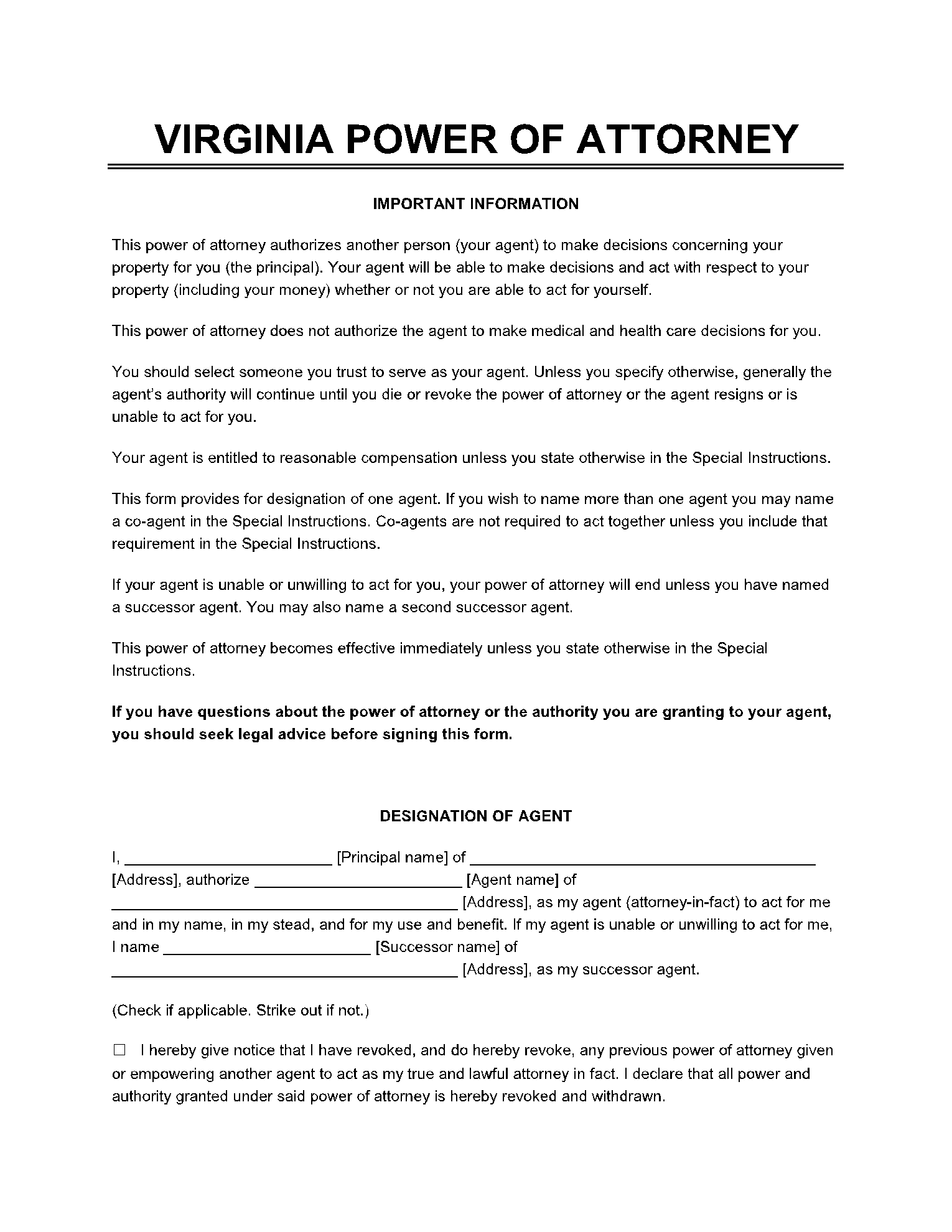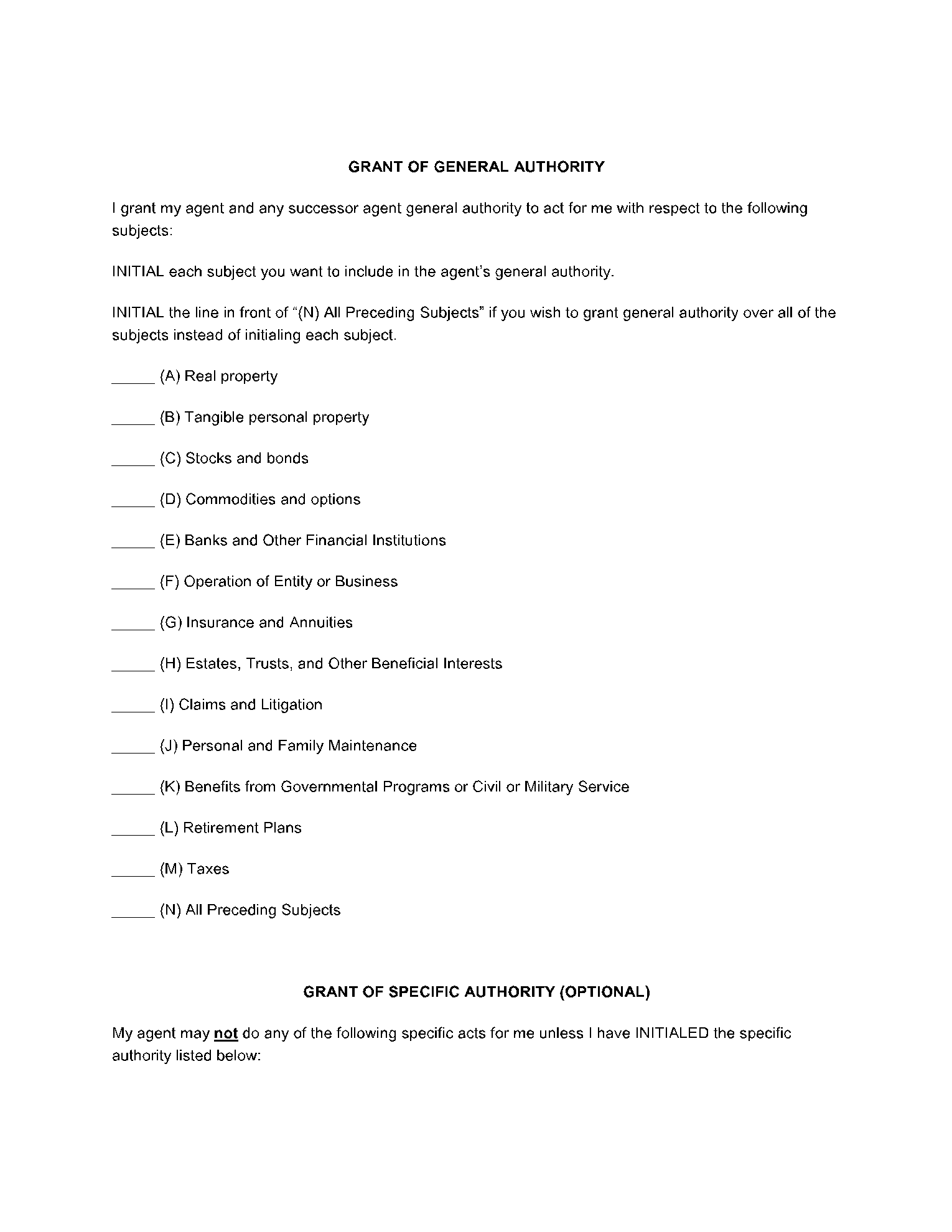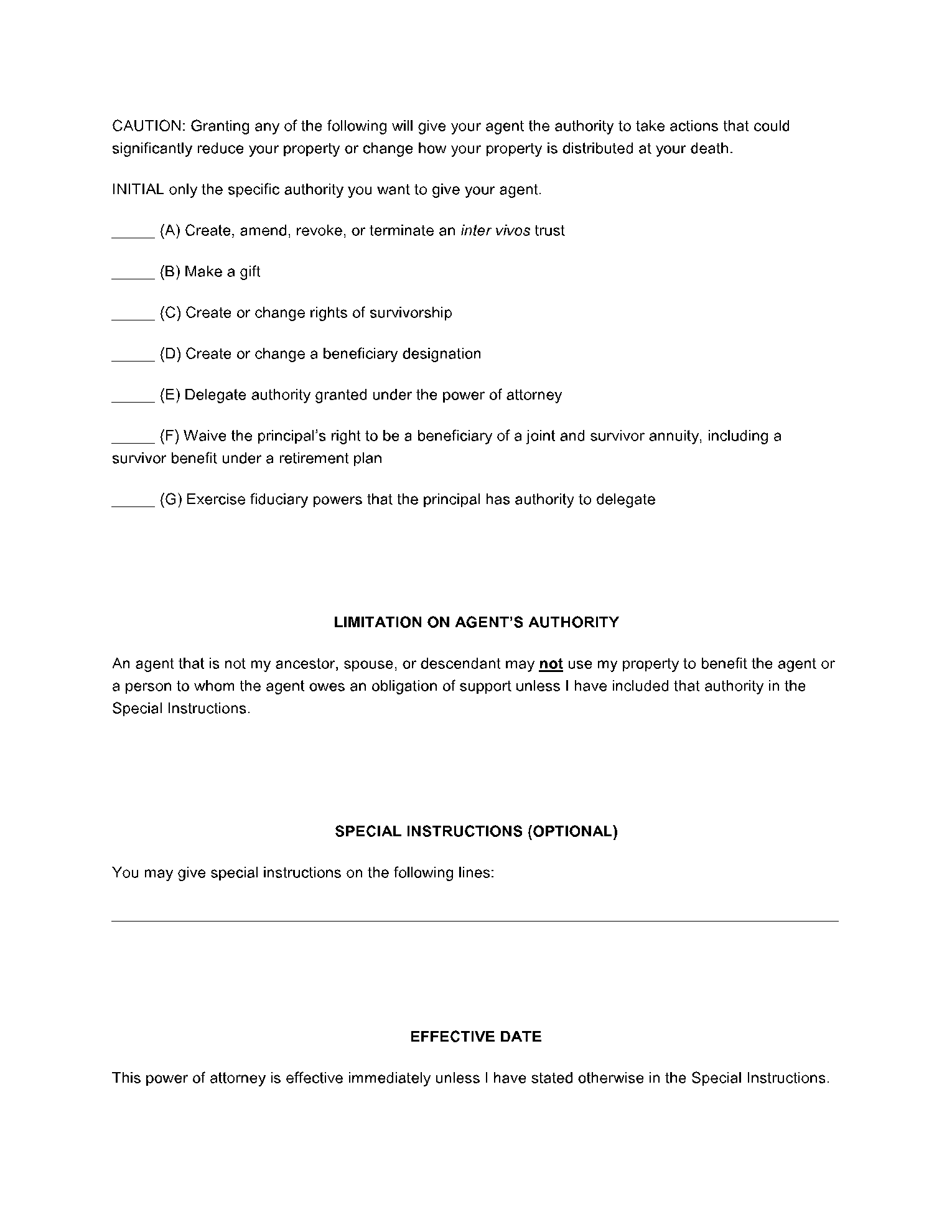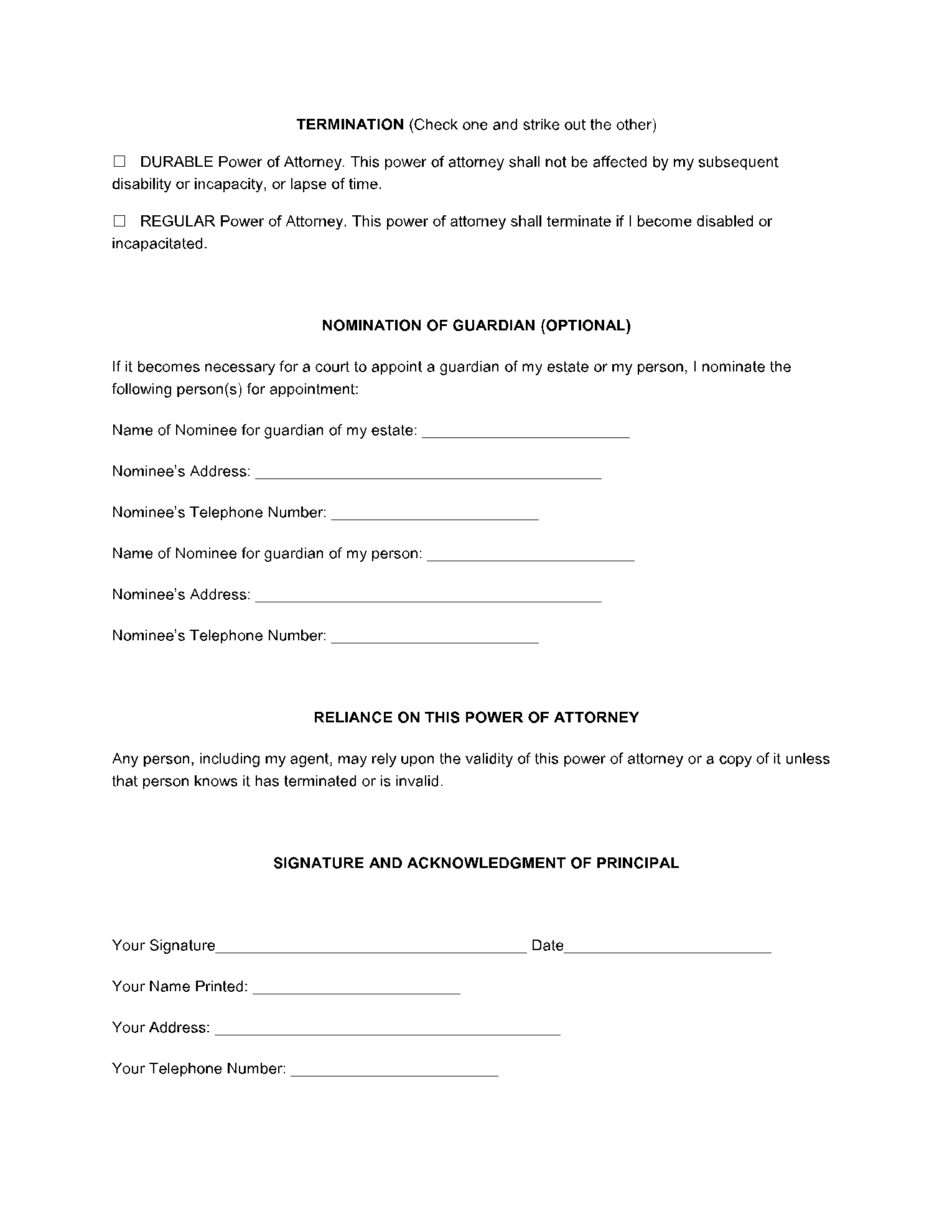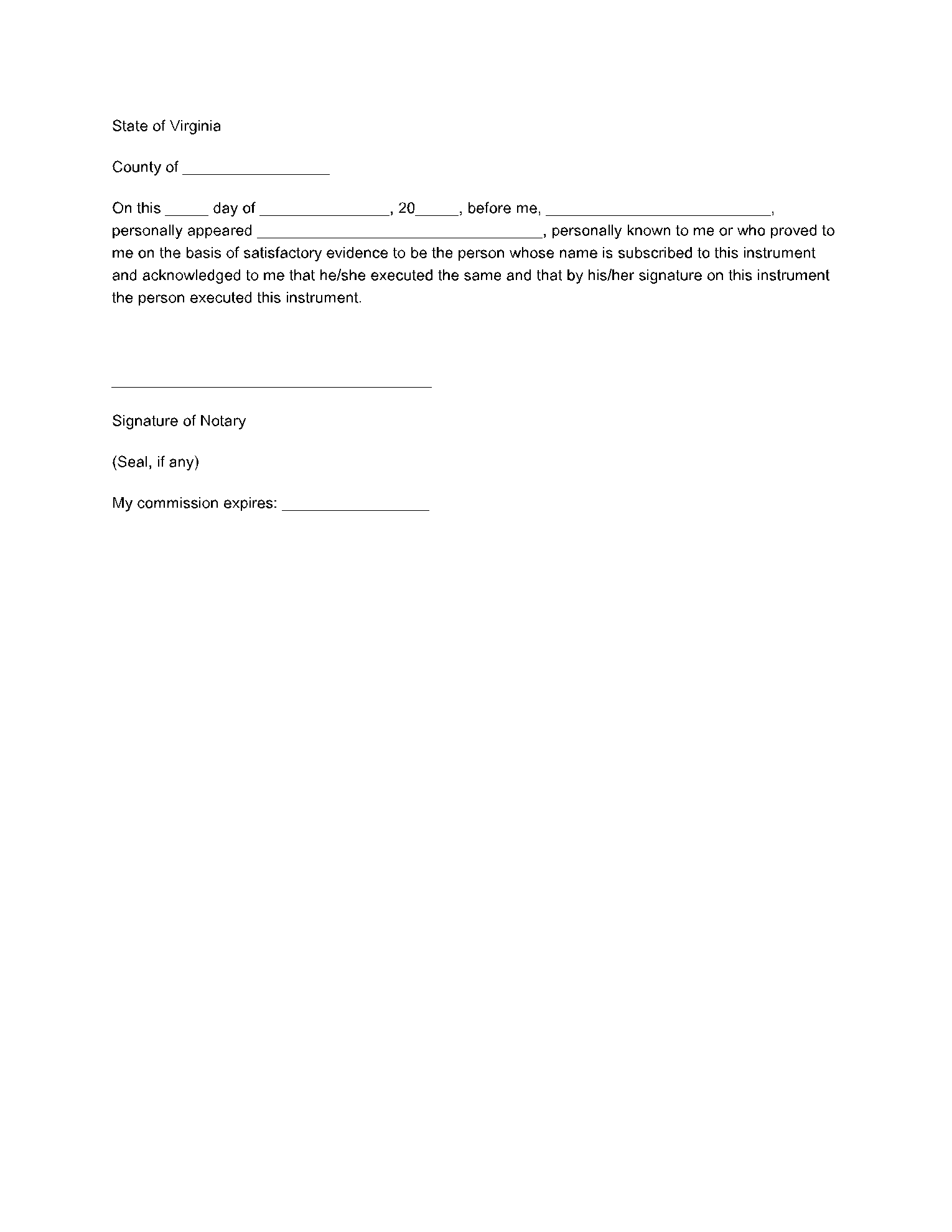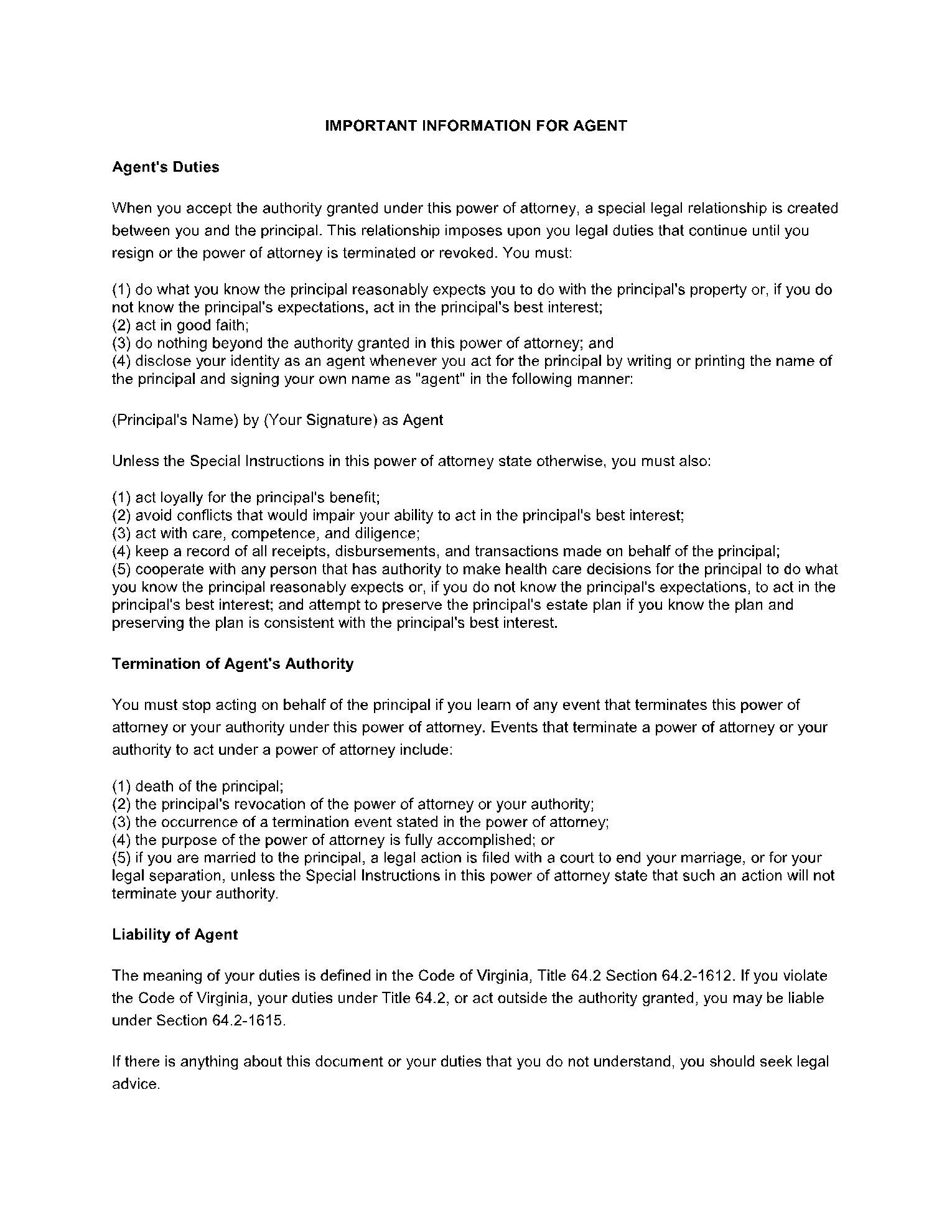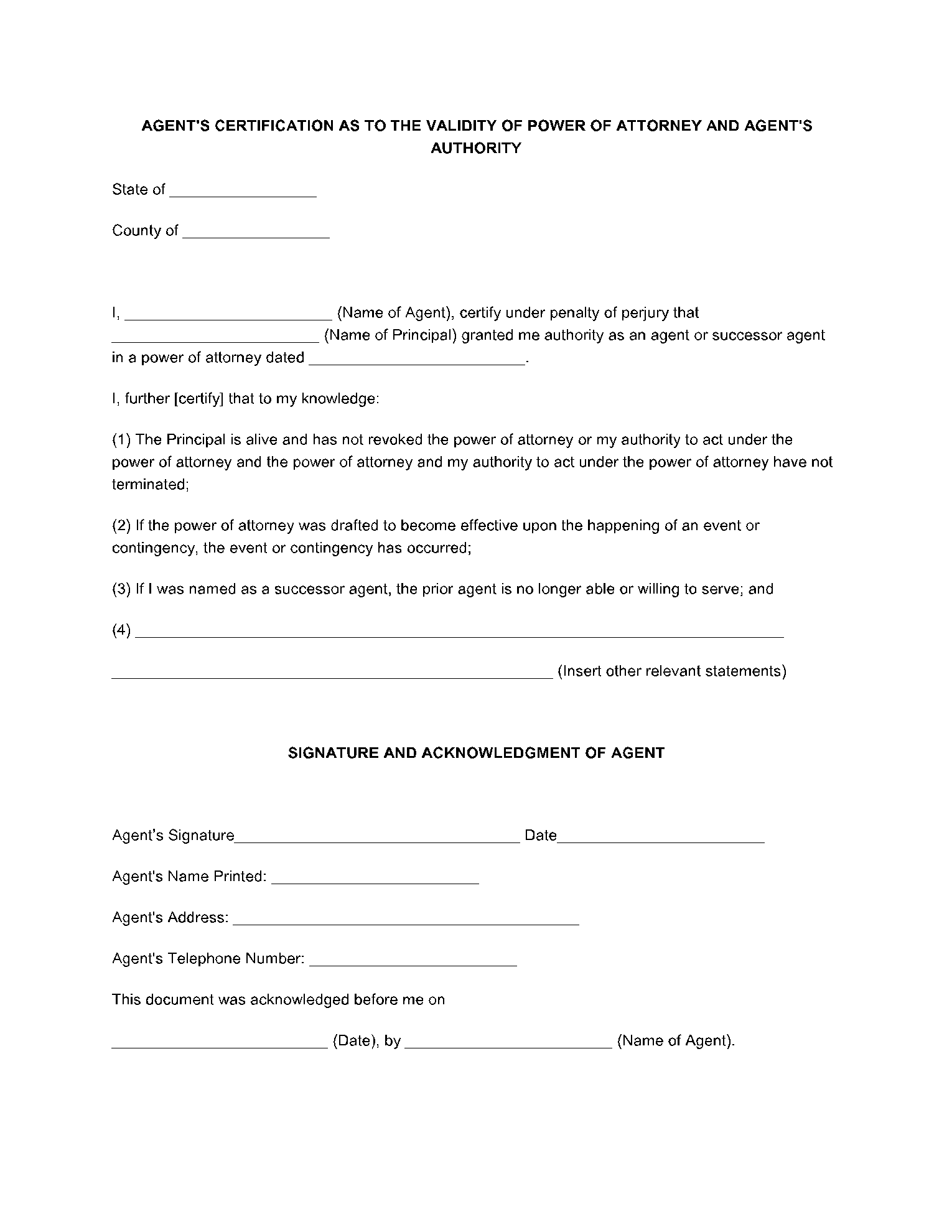A power of attorney Virginia form is crucial for many businesses and organizations inVirginia. Such a form ensures that the institution continues to function even when the people running the company are not available to run it.
Not only in companies, a power of attorney or POA is also used within families for personal management. In a state like Virginia, it is even more important given the fact that Virginia has adopted the Uniform Power of Attorney Act.
The following are some of the essential components that we have included in this template:
-
- Description of the property
- Details of the buyer and seller (or the transferor and transferee)
- Details of purchase and cost
- Information on applicable laws
What is a Virginia Power of Attorney?
A Virginia power of attorney form is a legal document that is used to authorize a person (known as the agent) in Virginia to work on behalf of the person-in-charge (known as the principal) in his or her absence.
Each state has its own Power of Attorney laws and requirements. The agent, also referred to as the “Attorney-in-fact,” can handle the day to day operations without anyone’s control or administration.
The document needs to follow a particular format for it to be recognized. A power of attorney form Virginia is often accompanied by a Power of Attorney Revocation Form, which is used to revoke the authorization granted to the agent if the terms and conditions are breached. Also, POA forms vary depending on their types (more on that later).
Our Power of Attorney Virginia Template Is Represents Your True Interests
Designate a representative you trust with our trusted Virginia power of attorney form template to secure your 'tomorrow.' Download the PDF & Word samples to get started.
Download our power of attorney Virginia form template by clicking below.
How Does the Virginia Power of Attorney Work?
A power of attorney in Virginia is covered under the Uniform Power of Attorney Act, Va Code § 65.2-1600 et seq.
This states that a “Power of Attorney” means a writing or similar record that is issued by a principal to authorize an agent to work during his/her absence. Thus, such a transfer of authority is only recognized when it’s in written form.
The document covers all the terms and conditions, scenarios where the POA will be and will not be applicable, and duties of the agent. Once issued, the agent is then liable to carry out the duties respectfully assigned to him.
The power stays with the agent until the time frame mentioned in the POA document. Or, it is automatically revoked if the agent commits something outside his/her scope of duties, and the stakeholders find it detrimental to the institution.
The agent also has the power to resign from the position and get out of the POA obligation. This is stated under § 64.2-1616. Agent's resignation; notice.
Types of Virginia Power of Attorney
The principal can issue various types of power of attorney forms. The Virginia state law allows the use of different types of POA forms depending upon the authority to be granted. This is covered under Article 2 of the Uniform Power of Attorney Act.
Some common types of Power of Attorney forms issued in Virginia are:
Conventional Power of Attorney
Also known as “Limited Power of Authority,” this is the most common POA form issued. This allows you to create your own set of conditions and duties as per your needs. With Conventional POA, you need to be explicit, precise, and specific.
Unlike Conventional POA, which is limited, a durable POA is issued for a lifetime. So the agent is expected to perform the duties unless the POA is revoked or resignation is put in place.
Springing POA
Springing POAs are issued, but don't come into effect immediately. Only a set of conditions mentioned in the form can trigger it. Before this, the agent remains powerless.
Financial POA
These types of POA forms are primarily used for financial purposes like stocks, large transactions, tangible assets, etc.
Medical POA
These are durable and used for healthcare purposes. Usually, when the principal suffers a medical condition that makes him/her unavailable, medical power of attorney Virginia is triggered.
Parental POA
Parental POA is used to authorize children to carry out tasks in the absence of their parents in Virginia.
Why is the Virginia Power of Attorney Important?
The power of attorney forms are important because they ensure the process and workflow are not clogged because of someone’s inavailability. For companies, this can result in thousands, if not millions in losses.
Since Virginia State law only recognizes a document in written format for power or authority transfer, the agent might face rejection if he/she has no such documents to represent someone else’s interests in Virginia. In this world full of uncertainties, it’s wise to get the Power of Attorney form created sooner rather than later.
Our Power of Attorney Virginia Template Is Represents Your True Interests
Designate a representative you trust with our trusted Virginia power of attorney form template to secure your 'tomorrow.' Download the PDF & Word samples to get started.
Download our power of attorney Virginia form template by clicking below.
Virginia Power of Attorney Requirements
To issue a power of attorney form, you need to meet the requirements. Some of them are:
Properly formatted and complaint
The POA document should strictly follow a proper format and be compliant with the Uniform Power of Attorney Act.
Capacity and soundness of mind of the agent
The agent undertaking the authority should have a sound mind to carry out the duties.
Witnesses
At least a few people need to be present when the POA is being created. They should sign at respective places as witnesses.
To create a legally-binding POA in a short amount of time, you can use pre-existing Virginia power of attorney form templates provided by CocoSign. Download, edit, and use those documents for your specific purposes.
DOCUMENT PREVIEW
- To receive and deposit funds in any financial institution, and to withdraw funds by check or otherwise to pay for goods, services, and any other personal and business expenses for my benefit. If necessary, to effect my attorney-in-fact’s powers, my attorney-in-fact is authorized to execute any document required to be signed by such banking institution.
________ SAFE DEPOSIT BOX - To have access at any time or times to any safe-deposit box rented by me or to which I may have access, wheresoever located, including drilling, if necessary, and to remove all or any part of the contents thereof, and to surrender or relinquish said safe-deposit box; and any institution in which any such safe-deposit box may be located shall not incur any liability to me or my estate as a result of permitting my attorney-in-fact to exercise this power.
________ LENDING OR BORROWING - To make loans in my name; to borrow money in my name, individually or jointly with others; to give promissory notes or other obligations therefor; and to deposit or mortgage as collateral or for security for the payment thereof any or all of my securities, real estate, personal property, or other property of whatever nature and wherever situated, held by me personally or in trust for my benefit.
________ GOVERNMENT BENEFITS - To apply for and receive any government benefits for which I may be eligible or become eligible, including but not limited to, Social Security, Medicare and Medicaid.
________ RETIREMENT PLAN - To contribute to, select payment option of, roll-over, and receive benefits of any retirement plan or IRA I may own, except my attorney-in-fact shall not have power to change the beneficiary of any of my retirement plans or IRAs.
________ TAXES - To complete and sign any local, state and federal tax returns on my behalf, pay any taxes and assessments due and receive credits and refunds owed to me and to sign any tax agency documents necessary to effectuate these powers.
________ INSURANCE - To purchase, pay premiums and make claims on life, health, automobile and homeowners' insurance on my behalf, except my attorney-in-fact shall not have the power to cash in or change the beneficiary of any life insurance policy.
________ REAL ESTATE
- To acquire, purchase, exchange, lease, grant options to sell, and sell and convey real property, or any interests therein, on such terms and conditions, including credit arrangements, as my attorney-in-fact shall deem proper; to execute, acknowledge and deliver, under seal or otherwise, any and all assignments, transfers, deeds, papers, documents or instruments which my attorney-in-fact shall deem necessary in connection therewith.
________ PERSONAL PROPERTY - To acquire, purchase, exchange, lease, grant options to sell, and sell and convey personal property, or any interests therein, on such terms and conditions, including credit arrangements, as my attorney-in-fact shall deem proper; to execute, acknowledge and deliver, under seal or otherwise, any and all assignments, transfers, titles, papers, documents or instruments which my attorney-in-fact shall deem necessary in connection therewith; to purchase, sell or otherwise dispose of, assign, transfer and convey shares of stock, bonds, securities and other personal property now or hereafter belonging to me, whether standing in my name or otherwise, and wherever situated.
________ POWER TO MANAGE PROPERTY- To maintain, repair, improve, invest, manage, insure, rent, lease, encumber, and in any manner deal with any real or personal property, tangible or intangible, or any interests therein, that I now own or may hereafter acquire, in my name and for my benefit, upon such terms and conditions as my attorney-in-fact shall deem proper.
________ GIFTS - To make gifts, grants, or other transfers (including the forgiveness of indebtedness and the completion of any charitable pledges I may have made) without consideration, either outright or in trust to such person(s) (including my attorney-in-fact hereunder) or organizations as my attorney-in-fact shall select, including, without limitation, the following actions: (a) transfer by gift in advancement of a bequest or devise to beneficiaries under my will or in the absence of a will to my spouse and descendants in whatever degree; and (b) release of any life interest, or waiver, renunciation, disclaimer, or declination of any gift to me by will, deed, or trust
________ LEGAL ADVICE AND PROCEEDINGS - To obtain and pay for legal advice, to initiate or defend legal and administrative proceedings on my behalf, including actions against third parties who refuse, without cause, to honor this instrument.
SPECIAL INSTRUCTIONS: On the following lines are any special instructions limiting or extending the powers I give to my attorney-in-fact (Write “None” if no additional instructions are given):
______________________________________________________________________
______________________________________________________________________
______________________________________________________________________

